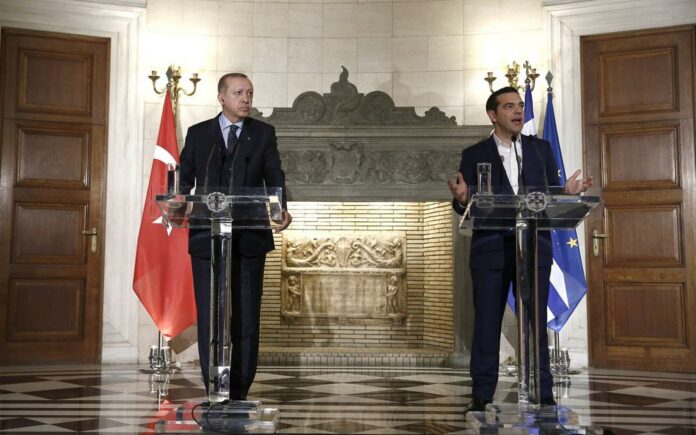The Greek government issued a “non-paper” hours after Prime Minister Alexis Tsipras received Turkish President Recep Tayyip Erdogan at his office in Athens, shortly after the outspoken Turkish leader’s direct call for a revision of a landmark treaty that normalized bilateral relations in 1923.
The first item cited by the Tsipras government, albeit in an unofficial fashion hours later, was the Greek side’s rejection of any notion of a revision.
The call by Erdogan for a revision, or “update” as he put it, of the 1923 Lausanne Treaty raised eyebrows in Athens and criticism by the opposition. The now politically dominant Erdogan is the first Turkish leader to prominently call for a revision of the specific international treaty, which had 11 signatories in 1923. The treaty officially ended warfare in Asia Minor and established a new Republic of Turkey on the ashes of the defunct Ottoman empire,
In other points, Athens welcomed a reference by the Turkish leader to a “Muslim minority” in western Thrace, echoing the same term in the 1923 treaty, whose members may be of Turkish, Pomak or Roma (gypsy) origins. The Turkish state has long called the autochthonous Muslims of western Thrace, who were excluded from a population exchange in 1923, merely as “Turks”, which Greek governments viewed as irredentist.
Athens on Thursday stood particularly on another Erdogan statement, reportedly made in talks with Tsirpas, namely, that the issue of the Muslim minority in Thrace is an “internal affair” for the Greek state.
Tsipras, according to the non-paper, also requested that a casus belli approved by the Turkish national assembly more than 20 years ago be abrogated. At the time, the Turkish legislature threatened war if Greece extended its territorial waters to 12 nautical miles, in line with the UN Law of the Sea. Along those lines, the government welcomed Erdogan’s phrase of Turkey not eyeing any neighbor’s territory.
The Greek government also pressed for a resumption of talks on Cyprus unification on the basis of the Guterres framework, i.e. dealing with the issue of invasion and occupation of one-third of Cyprus’ territory by Turkey, abolishing guarantors’ rights and the withdrawal of occupation troops, among others.
In touching on the political “hot potato” emanating from Ankara’s persistent demands for the extradition of eight Turkish officers and NCOs, the non-paper said Tsipras reiterated that putschists are not welcome in Greece. The eight men fled to Greece after a botched coup attempt in Turkey in July 2015.
At the same time Tsipras reminded Erdogan that Greece is a rule of law state, where the judiciary is independent, and whose decisions are respected.
Both sides reportedly agreed to resume talks over CBMs, with the inclusion of military and foreign ministry cadres, while also agreeing to new measures within the framework of the EU-Turkey agreement to alleviate the number of Mideast asylum seekers and would-be migrants on a handful of Greek isles.
No details were given on what these “new measures” entail.
More than a million people have been ferried over and trafficked from the opposite Turkish coast to the Greek isles since 2015, with the migrant/refugee crisis coinciding with SYRIZA’s landslide election victory in January 2015.
Finally, the Greek side reminded that restoration works on Ottoman-era mosques in the country have been undertaken without a hitch, with Greek authorities never thinking to allow a religious ceremony by another faith in such a mosque “.. as you did, unfortunately, and repeatedly at the Haghia Sophia (in Istanbul).”














